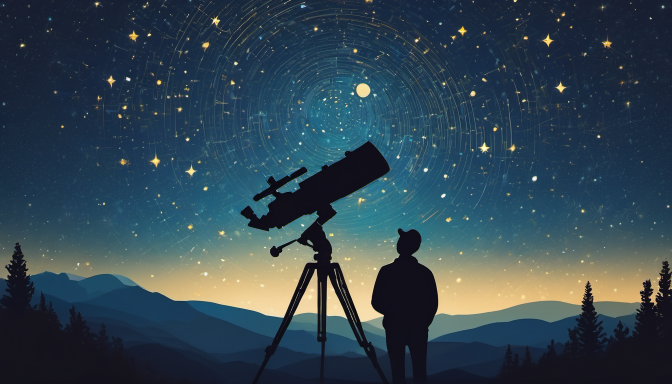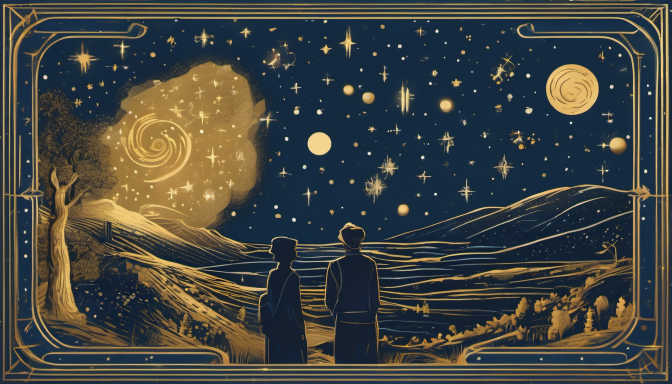Introduction to Astronomy
Astronomy, the study of celestial objects in the universe, has mesmerized humanity for centuries. From the twinkling stars above to the vast galaxies beyond, the mysteries of the cosmos continue to capture our imagination. Let’s embark a beginner’s journey into the enchanting realms of astronomy.
What is Astronomy?
Astronomy is the scientific study of celestial such as stars, planets, comets, asteroids, galaxies, and the universe as a whole. It seeks to understand the origins, evolution, and ultimate fate of these cosmic entities.
Why Study Astronomy?
Studying astronomy allows us to unravel the secrets of the universe, expand our knowledge of the cosmos, and gain a deeper appreciation for the beauty and complexity of the celestial realm.

The Role of Astronomy in Human History
Throughout history, astronomy has played a crucial role in shaping human culture, religion, and science. Ancient civilizations used astronomical observations to create calendars, navigate the seas, and predict celestial events.
Basics of Astronomy
Understanding the Night Sky
To navigate the night sky, beginners can familiarize themselves with key constellations, stars, and planets visible to the naked eye. Consider investing in a star chart or astronomy app to aid in your stargazing adventures.
Observing Tools and Techniques
Telescopes, binoculars, and even the unaided eye can help you observe celestial objects with clarity. Experiment with different tools and techniques to enhance your viewing experience.
Key Concepts in Astronomy
Terms like light years, celestial bodies, and the electromagnetic spectrum are fundamental to understanding the vastness and intricacies of the universe. Take time to grasp these concepts to deepen your knowledge of astronomy.
The Solar System
Our Sun: The Center of the Solar System
The Sun, a massive ball of plasma, provides light, heat, and energy to the planets in our solar system. Learn about the Sun’s structure, composition, and the vital role it plays in sustaining life on Earth.
The Planets and their Moons
From the rocky terrain of Mercury to the icy oceans of Europa, each planet in our solar system boasts unique features and environments. Explore the moons of giant planets like Jupiter and Saturn for fascinating discoveries.

Asteroids, Comets, and Meteors
Asteroids, comets, and meteors are remnants of the early solar system, offering insights into its formation and evolution. Learn about the impact of these celestial bodies on Earth and beyond.
Stars and Galaxies
Types of Stars
Stars come in various sizes, colors, and stages of evolution. Explore the life cycle of stars, from nebulous formation to explosive supernova events.
The Milky Way and Other Galaxies
Our Milky Way galaxy is just one of billions in the universe, each housing countless stars, planets, and nebulae. Discover the vastness of the cosmos by studying different types of galaxies and their intriguing characteristics.
Black Holes and Other Celestial Phenomena
Black holes, quasars, and pulsars are some of the most enigmatic and powerful objects in the universe. Delve into the mysteries of these celestial phenomena and their impact on surrounding cosmic bodies.
Life Beyond Earth
The Search for Exoplanets
Exoplanets are planets orbiting stars outside our solar system, offering the potential for alien life. Follow the latest discoveries in exoplanet research to uncover habitable worlds beyond our own.
Possibilities of Alien Life
The search for extraterrestrial life captivates scientists and enthusiasts alike, fueling speculation about the existence of intelligent beings in the universe. Consider the implications of discovering alien life forms on Earth or elsewhere.
The Future of Space Exploration
As humanity ventures further into space, the possibilities for exploration, colonization, and discovery multiply. Stay informed about upcoming missions, technologies, and breakthroughs in the field of space exploration.
Summary
In this beginner’s guide to astronomy, we have explored the wonders of the universe from basic concepts to advanced theories. By understanding the night sky, the solar system, stars and galaxies, and the possibilities of life beyond Earth, we have taken the first steps in unraveling the secrets of the stars.

FAQs:
- Can I study astronomy without a background in science?
- How can I start stargazing as a beginner?
- What is the best telescope for beginners interested in astronomy?
Remember, the universe is waiting to be discovered. Happy stargazing, fellow astronomers!
You can also read Unveiling the World of Commercial Banks: Functions, Operations, and Impact and you can watch the videos on the above topics



